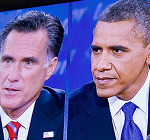In their third and final debate leading up to the U.S Presidential elections on November 6, incumbent President Barack Obama and his Republican challenger Mitt Romney left no doubt about their commitment to using American military power to defend allies and insure the U.S. remains the world’s dominant superpower.
The deeply hawkish rhetoric from both candidates seems a direct fallout from the attacks Romney has made on Obama’s international record and the civil war in Libya that resulted in the death of a U.S. ambassador and his three colleagues. Obama, prepared for another round of attacks on international security, came ready to deflect any suggestion of weakness by his administration. Polls showed Romney’s aggressive approach closed the gap between the candidates.
Because there was no room for either contender to back off from a hardline position, their attacks turned to style. Obama accused Romney of “confusing” the world with shifting foreign policy positions which were also “wrong.” Romney said Obama signaled weakness by “going on an apology tour” to the Middle East after taking office and befriending “the world’s worst actors.”
“All this suggests to the Iranian mullahs – hey we can keep going along spinning centrifuges and now they’ve got 10,000 of them.”
The debate setting in Boca Raton, Florida, required both candidates to sit at a desk facing moderator Bob Schieffer of CBS. That eliminated the dramatic arm swinging, face offs and personal encounters of the two previous debates when the candidates walked toward each and interrupted continually from the floor. Some voters liked that action, but polls show women, a vital bloc for each, were turned off by the belligerent theatrics.
Instant polls, often partisan, showed each candidate winning slightly. Obama restored his foreign policy credibility as a forceful leader, which his first debate lacked, and won back ground on the international leadership he’d expected to claim before the Libya fiasco. Even so, the last debate over foreign issues that are murky and complex for voters showed more than ever that the deciding issue in key states will be the U.S economy.
Because he had come to office facing the worst financial crisis since the Great Depression – inherited from Republican George W. Bush – Obama had two years of goodwill among voters to reshape the nation’s economic future. But sometime around 2010 – after bank bailouts and $2 trillion in spending and assistance by his administration and the Federal Reserve – the Bush debacle became Obama’s economy.
Faced with that economic crisis, few Americans spent time on foreign affairs. Polls show that voters want a respite from America policing the world. They don’t want to get engaged with Syrian rebels, they want the troops home from Afghanistan sooner than 2014, and don’t support an Israeli bombing of Iran’s nuclear facilities. They are unclear about what has emerged with the Arab Spring, except to see turmoil, like the bombing in Lebanon, point to escalating violence.
Iraq is finished and Obama says troops will be out of Afghanistan in 2014. He also ordered the killing of Osama Bin Laden. That should be all to the good.
Still, Romney made powerful headway with voters in just the last month by projecting Obama is a weak international leader whose efforts had failed. Romney had a hot hand on Benghazi, Libya, where Obama waited two weeks to agree that terrorists killed his ambassador, propelling Romney’s supporters to accuse the President of a “cover-up.” Until tonight, Romney has been able to lead an attack on international policy without saying much about what a Romney administration would do differently. That still holds true, and in this debate, even the appearance of difference was dropped.
Each candidate tried hard to tie the international issues to the economy at home. Romney said America’s $1 trillion budget deficits projected weakness to leaders abroad and that fixing the U.S. economy would be one of the best foreign policy moves he could make. Obama said Romney was helping China by investing in companies there even as he called China a cheater on trade. Romney responded, saying he’d declare China a currency manipulator on his first day in office. Asked if singling out China might start a trade war, Romney showed with his hands the small amount the U.S. exports to China and the vast gap, also with his hands, between what the US imports from China. China is the one which doesn’t want a trade war, he exclaimed.
Every presidential candidate for three decades has promised to get tough with China but none, after getting elected, has followed through. The only China moderate this election round was Jon Huntsman, the former U.S. Ambassador to Beijing – and like Romney, a Morman – who said when debating Romney on November 9, 2011, “You can throw out applause lines and you can say that you’re going to slap on tariffs—that doesn’t work.” Huntsman argued the U.S-China relationship will need to be managed, with pluses and setbacks on both sides, for decades ahead. “There is no other relationship in the world that, if mismanaged, carries greater long-term negative consequences for the U.S., the Asia-Pacific region, and the world,” he reaffirmed in a May 7 article in The Wall Street Journal.
In the final weeks of the campaign, moderate views don’t seem to count as the two candidates maneuver to never be seen as less tough than the other. Be tough, be cautious, is the message.
Bob Dowling is Editorial Advisor to Gateway House: Indian Council on Global Relations.
This article was exclusively written for Gateway House: Indian Council on Global Relations. You can read more exclusive content here.
For interview requests with the author, or for permission to republish, please contact outreach@gatewayhouse.in.
© Copyright 2012 Gateway House: Indian Council on Global Relations. All rights reserved. Any unauthorized copying or reproduction is strictly prohibited.


